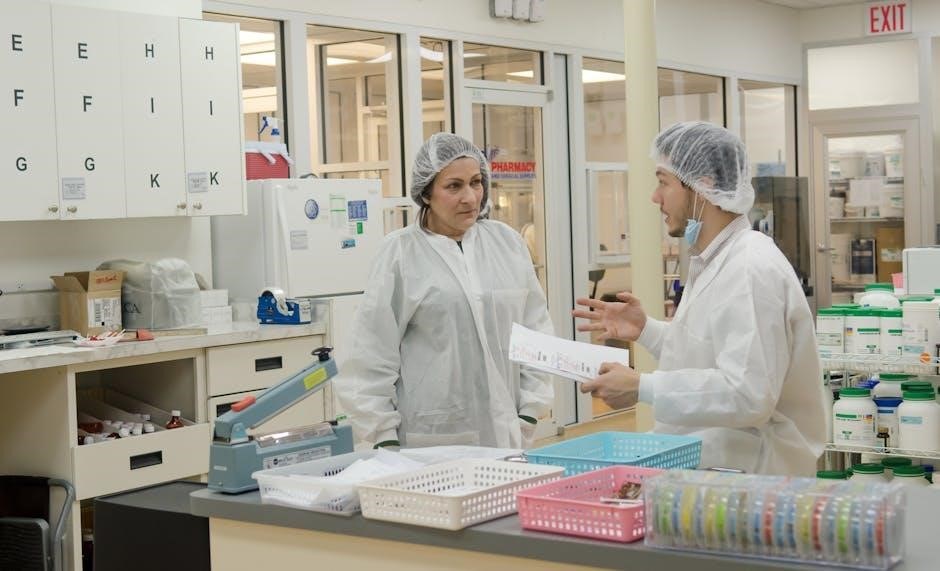The Licensed Clinical Social Worker (LCSW) exam is a critical step for professionals seeking advanced licensure in clinical social work․ It assesses knowledge, skills, and competencies required for ethical and evidence-based clinical practice․ Passing this exam demonstrates expertise in diagnosis, treatment, and advocacy, essential for delivering high-quality care․
Overview of the Exam and Its Importance
The Licensed Clinical Social Worker (LCSW) exam is a standardized assessment designed to evaluate a candidate’s knowledge, skills, and competencies in clinical social work․ It is a crucial step toward obtaining advanced licensure, enabling professionals to provide ethical, evidence-based clinical services․ The exam focuses on key areas such as assessment, diagnosis, treatment planning, and intervention strategies․ Passing the LCSW exam demonstrates a commitment to professional excellence and ensures that practitioners meet the high standards required to deliver effective mental health services․ It is essential for advancing careers in clinical social work and maintaining public trust in the profession․ Preparation is vital for success․
Eligibility Requirements for the Exam
Candidates must hold a master’s degree in social work, complete supervised clinical hours, and fulfill specific coursework requirements to qualify for the LCSW exam․
Understanding Educational and Work Experience Criteria
To qualify for the LCSW exam, candidates must complete a master’s degree in social work from an accredited program․ Additionally, they need post-graduate clinical experience under supervision, typically involving direct client care․ This includes conducting assessments, developing treatment plans, and applying therapeutic interventions․ The required hours and settings vary by state, but they generally emphasize hands-on experience in mental health or clinical settings․ Ensuring that both educational and practical requirements align with state-specific regulations is crucial before applying for the exam․ Proper documentation and verification of these criteria are essential steps in the licensure process․
Study Materials and Resources
Key study materials include textbooks, online study guides, and practice questions․ Utilize resources like the Diagnostic and Statistical Manual of Mental Disorders for clinical knowledge and exam-focused workbooks․
Recommended Textbooks and Online Study Guides
Essential textbooks for LCSW exam preparation include the DSM-5 and Clinical Social Work Practice․ Online platforms like Exam-master and Social Work Exam Tutor offer comprehensive study guides․

Exam Format and Content
The LCSW exam consists of 150 multiple-choice questions, requiring approximately 3 hours to complete․ It covers clinical assessment, intervention strategies, and professional ethics, evaluating both knowledge and practical application skills․
Breakdown of Question Types and Subject Areas
The LCSW exam includes 150 multiple-choice questions, divided into key subject areas: clinical assessment, diagnosis, treatment planning, interventions, professional ethics, and research․ Questions are designed to test both theoretical knowledge and practical application, with a focus on case-based scenarios․ Approximately 70% of questions address clinical practice, while 30% cover professional standards and legal issues․ The exam also includes questions on evidence-based practices, cultural competence, and psychopharmacology․ Candidates must demonstrate the ability to analyze complex clinical situations, apply ethical principles, and select appropriate interventions․ The exam is timed, allowing 3 hours for completion․
Preparation Strategies
Effective preparation involves structured study plans, utilizing recommended textbooks and online guides․ Prioritize active learning techniques like self-quizzing and case analysis to enhance retention and application skills․
Effective Time Management and Study Techniques
Mastering time management is crucial for LCSW exam success․ Create a detailed study schedule, allocating specific blocks for each topic․ Use active learning techniques like self-quizzing and case analysis to engage deeply with material․ Prioritize challenging areas early to allow ample review time․ Incorporate breaks to maintain focus and prevent burnout․ Leverage mnemonic devices and concept maps to organize complex concepts visually․ Regularly review and practice with sample questions to build familiarity with the exam format․ Consistency and adaptability in your study routine will enhance retention and confidence, ensuring comprehensive preparation for the exam․

Practice Exams and Simulations
Practice exams and simulations are essential tools to assess readiness and refine test-taking strategies․ They familiarize candidates with the exam format, timing, and content, reducing anxiety and improving performance․
Utilizing Sample Questions for Better Preparation
Sample questions are a cornerstone of effective exam preparation․ They help identify knowledge gaps, refine test-taking strategies, and build confidence․ By practicing with realistic scenarios and case studies, candidates can familiarize themselves with the exam format and content․ Timing oneself while answering questions mimics real-test conditions, enhancing time management skills․ Additionally, analyzing correct and incorrect answers provides insights into strengths and areas needing improvement․ Regular review of sample questions reduces test anxiety and ensures a deeper understanding of clinical concepts․ This targeted practice is essential for mastering the complexities of the LCSW exam․

Licensing Process
The licensing process typically includes submitting an application, paying required fees, and completing a background check․ Some jurisdictions may require additional steps like interviews or providing proof of education and supervised experience․ Ensure all documents are verified to meet state-specific regulations․
Steps to Follow After Passing the Exam
After passing the LCSW exam, submit your official score report to your state licensing board․ Complete any remaining application requirements, such as paying licensure fees or undergoing a background check․ Ensure all necessary documentation, including transcripts and supervised clinical hours verification, is provided․ Some states may require additional paperwork or interviews․ Once approved, your license will be issued․ Finally, familiarize yourself with ongoing continuing education requirements to maintain your certification․ Check your state’s specific guidelines to ensure compliance with all post-exam procedures for the issuance of your license․
Maintaining Certification
Maintaining LCSW certification requires completing continuing education courses, adhering to ethical standards, and renewing licensure periodically․ Stay updated on professional development and industry advancements to uphold certification․
Continuing Education and Professional Development
Continuing education is vital for LCSW certification maintenance․ Professionals must complete approved courses in ethics, cultural competence, and clinical practice․ Engaging in workshops, conferences, and online training ensures skills stay current․ Many states require a minimum number of CEUs annually, focusing on evidence-based practices․ Professional development also involves staying informed about industry trends and research․ By committing to lifelong learning, social workers enhance their expertise, providing effective and ethical services․ Regular updates on mental health treatments and laws are essential for maintaining competency and licensure․

Common Challenges and Solutions
Candidates often face test anxiety and burnout․ To overcome these, prioritize self-care, use stress-reduction techniques, and maintain a balanced study schedule․ Effective time management and focused study strategies are key to success․ Regular breaks and practice exams can help build confidence and reduce anxiety, ensuring a well-prepared approach to the exam․
Overcoming Test Anxiety and Study Burnout
Test anxiety and study burnout are common challenges for LCSW exam candidates․ To manage these, incorporate mindfulness practices, such as deep breathing and meditation, to reduce stress․ Establishing a consistent study routine with regular breaks can prevent burnout․ Prioritize self-care by ensuring adequate sleep, a healthy diet, and physical activity․ Engaging in group study sessions or seeking support from peers can foster a sense of community and shared purpose․ Additionally, practicing relaxation techniques and setting realistic goals can help maintain focus and motivation throughout the preparation process․ Remember, mental well-being is crucial for optimal performance․
Mastering the LCSW exam requires dedication, strategic preparation, and self-care․ By utilizing effective study strategies and maintaining mental well-being, candidates can confidently achieve licensure and advance their careers․
Final Tips for Success
The key to excelling on the LCSW exam lies in consistent effort and strategic preparation․ Prioritize active learning over passive reading, and regularly test your knowledge with practice exams․ Stay updated on clinical theories and evidence-based practices, as these are heavily emphasized․ Additionally, focus on time management during the exam to ensure you answer all questions․ Maintain a healthy work-life balance to prevent burnout, and build a support network of peers or mentors․ Finally, review your mistakes and seek feedback to refine your approach․ With persistence and dedication, you’ll be well-prepared to achieve success․
